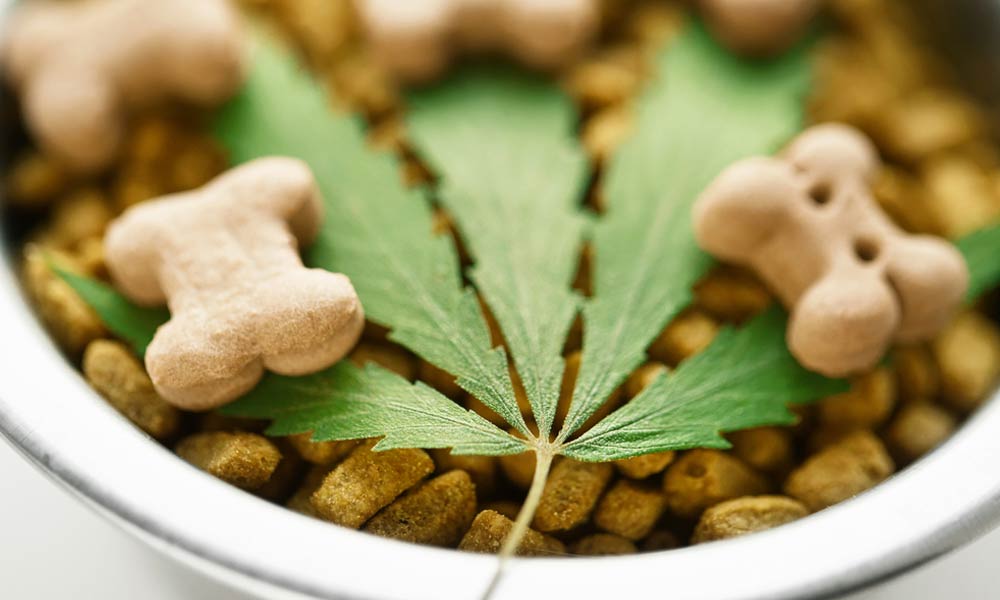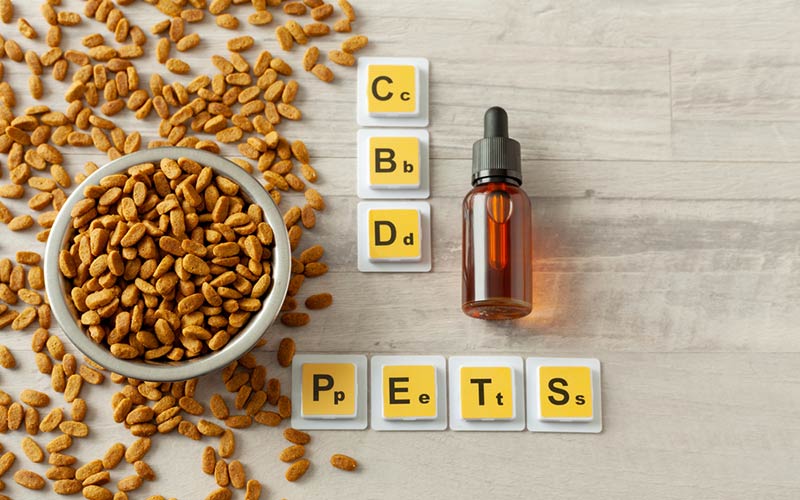
As the CBD industry develops and consumers become more informed of the appropriate use of CBD, new questions are arising about the safety of CBD for pets.
Depending on when you give your pet CBD, they can respond differently. You can use this information to get the most out of your pet’s supplements, as well. Here, we’ll answer the question; Is CBD safe for pets? Along with other related questions.
Let’s get started!
What is CBD?
Cannabidiol is part of a category of compounds normally found in Cannabis. They interact with the endocannabinoid system of the body. This system assists the body in maintaining homeostasis.
CBD vs THC
CBD is among over 80 chemical compounds known as cannabinoids, sourced from the cannabis plant. Different from THC (tetrahydrocannabinol), another well-known cannabinoid, CBD, isn’t psychoactive.
Alternatively, CBD has similar metabolic characteristics to NSAIDS, including Rimadyl and ibuprofen. These characteristics help regulate numerous processes in the body, like blood clotting and inflammatory responses.
Avoid offering your pet anything with THC, including marijuana, as this is the major psychoactive ingredient of Cannabis. There isn’t sufficient research to support giving your pet such products.
On the other hand, products with CBD may help boost your pet’s quality of life when used along with different therapies.
Is CBD Safe for Pets?
According to a report by the World Health Organization, pure CBD for pets seems safe and well-endured. Nonetheless, a study on canines in 2018 confirmed a surge in alkaline phosphatase, a liver enzyme, in dogs when they consume CBD.
As part of the study done in 2018, McGrath did multiple tests on liver function to ensure the canine’s liver wasn’t failing. However, it isn’t clear whether the increase in ALP levels resulted from something entirely harmless or could eventually turn into a serious issue.
That said, pet owners have to consider quality control. Currently, the CBD market isn’t properly regulated; products infused with CBD have ingredients that aren’t included on their labels, such as THC, which is toxic to pets.
Legally, CBD-infused products must have 0.3% or less THC, which is typically safe for pets. If possible, go with pet-specific CBD products with 0% THC and watch out for any THC poisoning symptoms like diarrhea, lethargy, vomiting, and restlessness.

Scientific Research on CBD Use in Pets
Numerous studies have revealed a lot about CBD for pets and its benefits to people suffering from anxiety, but how about cats and dogs? While anxiety is a common reason for offering your pet CBD, this is hugely based on circumstantial evidence.
In September 2020, a published study revealed that CBD might not significantly impact a canine’s anxiety. This research was done by Lincoln Memorial University and the University of Kentucky researchers. They observed dogs from different breeds and their response to firework sounds before and after consuming CBD. The pets offered CBD treats had reduced stress hormone levels than the other pets.
Note: Pet owners should know that their pets may react differently to CBD.
A study published in 2019 revealed that canines metabolize and absorb CBD quicker than cats. A few behavior shifts were noticed, and the CBD-infused treats were found to be somewhat safe for both cats and dogs. However, some cats displayed side effects like head shaking and vomiting.
Since January 2022, different research has been done on the impact and efficiency of CBD on pets. It is clear that more research needs to be conducted to definitively establish how CBD can impact cats and dogs, precisely regarding long-term utilization.
How Does CBD Work in Pets?
It isn’t clear, and a broad scope of researchers worldwide are attempting to solve this puzzle.
For example, canines have an endocannabinoid system, though whether CBD interacts with it as it does in humans is unclear. All that’s certain is that CBD is metabolized by a canine’s liver.
Benefits of CBD for Pets
After reviewing how CBD work, do you want to know the benefits of CBD for your loving pets? Well, CBD has potential benefits for pets, including:
Seizures
This is among the most researched use for CBD for humans, though there are limited studies about pets. In canines, seizures can be as a result of multiple underlying conditions.
Regarding idiopathic epilepsy, there is research that implies CBD could be handy in decreasing seizure frequency in dogs, though this isn`t definitive. Nevertheless, these upsides are visible in canines that take seizure medication and CBD oil.
Arthritis
Since CBD has similar metabolic characteristics as anti-inflammatory medication, it’s sensible that pet owners would go for it to aid with some inflammatory illnesses.
Osteoarthritis is among the most common inflammatory illnesses in canines. Approximately 25% of dogs are diagnosed with arthritis, while about 60% display some symptoms of this condition.
Pain
Theoretically, the anti-inflammatory advantage visible in arthritic pets is also evident in pets with different inflammatory pain, particularly back pain from IVDD (Intervertebral Disc Disease).
Initial research reveals that products infused with THC and CBD are particularly beneficial for painkilling in humans. On the other hand, there isn’t sufficient research on canines; hence THC shouldn’t be fed to them.
Cancer
For humans, CBD has been researched for likely use in cancer patients to treat tumors and treat secondary chemotherapy and cancer symptoms. However, there’s limited research on CBD utilization in pets with cancer.
Anxiety
Probably, the biggest myth is that CBD can deal with your pet’s anxiety. Theoretically, CBD could aid reduce inflammation and relieve pain. However, since CBD doesn’t have psychoactive properties, it can’t be said for certain that it could treat anxiety in pets. Like most things CBD, this one needs more research.
THC Dangers for Pets
THC, unlike CBD, can be harmful to your pet. THC is toxic to canines and cats, and the severity of the side effects depends on the amount the pet has consumed. Unfortunately, the effects could drag along for even days.
At this point, your pet may be unable to eat or stand. If you suspect your pet has consumed a THC-infused product, you should take them to the vet immediately, as secondary THC side effects should be assessed closely to dodge complications.
All the same, general, life-threatening risks for canines from Cannabis aren’t common. Normally, THC toxicity happens when a pet consumes THC-infused products with raisins, coffee or chocolate, which are also harmful to your pet.
Most Common CBD Products for Dogs
So, want some CBD treats for your furry friends? Well, there are several CBD products are available for dogs, such as:
CBD Oils
Also known as CBD tinctures, the best CBD oil for pets comes with a dropper that eliminates the guesswork of dosing your pet. With CBD oil, you’ll know the amount your pet is getting. Also, you can adjust the dose easily if the need arises.
These tinctures are administered beneath the pet’s tongue. This lets the CBD swiftly diffuse to the blood via tissues beneath your pet’s tongue.
CBD Treats and Chews
All pets love treats, which is the beauty of CBD treats and chews. The best CBD dog treats make it easier to administer CBD to your pet. Moreover, they come in different sizes and shapes and are normally produced using tasty ingredients that your pet loves, such as turmeric and peanut butter.
Further, some organizations also produce CBD-infused coconut oil and peanut butter.
CBD Topical
Fortunately, not all CBD products for pets have to be consumed. Pet owners often look for precise CBD benefits that can be attained through topical use. Like applying coconut oil to their skin.
CBD Oil or Treats: Which is Better for Pets?
CBD hemp oil is an efficient means to offer pets potent and concentrated amounts of CBD in a single dose. Pet owners can administer the oil orally or in the food. The benefits of hemp oil are similar to CBD treats, though it’s easier to deliver huge doses with CBD oil.
CBD Dosage for Pets
Research on CBD for canines with seizures or arthritis usually uses 2 to 8 mg per Kg, twice daily. This dosage is safe and relatively efficient for seizures and arthritis. But research needs to be conducted to determine the best CBD dosage for dogs.
Can CBD Cause an Overdose in Pets?
CBD doesn’t have known toxicity levels, so if utilized as directed, it might not cause an overdose.
Side Effects of CBD in Pets
Here are some of the potential side effects of CBD if not administered in the right dosage:
Dry Mouth
Studies have shown that CBD can reduce saliva production. So, your pet will be thirsty than usual.
Drowsiness
CBD’s calming effect can result in drowsiness, precisely if administered in high doses.
Low Blood Pressure
High CBD doses can cause a temporary lowering of blood pressure. While the drop isn’t significant, it might lead to light-headedness.
Will CBD Get My Pet High?
CBD in CBD oil for pets is normally derived from hemp, which usually has low amounts of THC, the psychoactive compound in Cannabis. CBD is non-psychoactive; hence won’t get your pet high.
Laws on CBD Use in Dogs and Cats
In North America, CBD products are federally legal, but many territories and states have different limitations regarding possession and distribution. What’s more, because of the scarce research findings, the FDA doesn’t recommend CBD use in pets. Again, CBD as an ingredient in your pet’s food is illegal in the USA.
Can Veterinarians Prescribe CBD for pets?
No.
In the US, veterinarians aren’t allowed to dispense or prescribe CBD or recommend pet owners to buy CBD-infused products.
Nonetheless, they can tell you about the potential risks and advantages of the treatment plan involving these products.
Closing thoughts
CBD has taken the world by storm, and with good reason. Pet owners are turning to this option for different reasons, and thanks to the pet firms dedicated to creating superior CBD products, there are many options to choose from.
